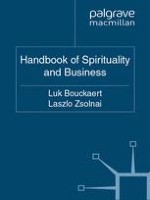2011 | OriginalPaper | Buchkapitel
Deep Leadership in Spirit-Driven Business Organizations
Erschienen in: Handbook of Spirituality and Business
Aktivieren Sie unsere intelligente Suche, um passende Fachinhalte oder Patente zu finden.
Wählen Sie Textabschnitte aus um mit Künstlicher Intelligenz passenden Patente zu finden. powered by
Markieren Sie Textabschnitte, um KI-gestützt weitere passende Inhalte zu finden. powered by
As in the severe economic downturn of the early eighties, there is again a call for new leadership in the aftermath of the worst financial and economic crisis since the Great Depression of the 1930s. Unlike the eighties it is suggested here that we look towards the East, rather than the West, the origin of the greed-is-good kind of capitalism, for a new paradigm of deep leadership. In October 2006, just before the outbreak of the credit crisis, Business Week reported on the apparent emergence of a new type of capitalism, karma capitalism, which may not have been such a bad idea after all. Some successful Indian companies, for example, may constitute the cutting edge of this new paradigm of leadership in the business world.
